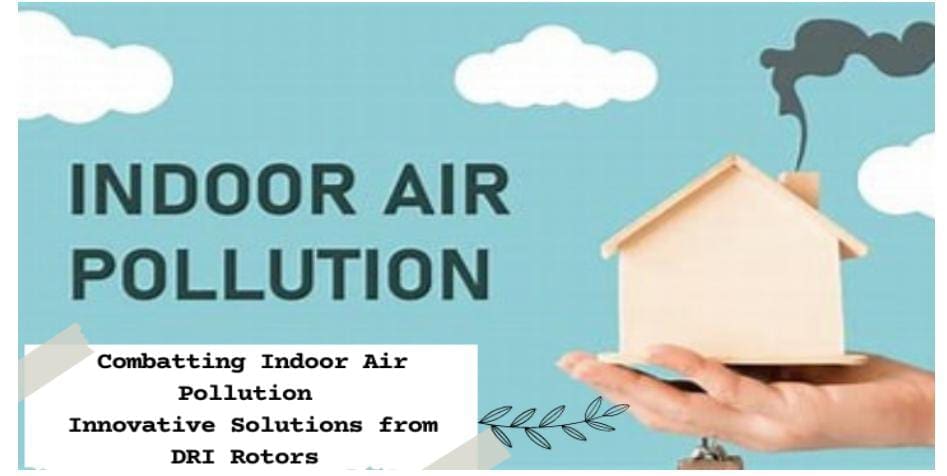Indoor air pollution results in a significant health risk worldwide, with the World Health Organization stating that it is responsible for 4.3 million deaths annually. In the context of India, a country grappling with high levels of indoor and outdoor pollution, the scenario is grave. ICMR, or the Indian Council of Medical Research (ICMR), estimates that one in eight deaths in India is attributable to air pollution. As industry owners and business operators, we can’t ignore the significance of air quality in our workspaces. It is where DRI Rotors, a leader in air management solutions, uses innovative technology to combat indoor air pollution effectively.
Understanding the Challenge of Indoor Air Pollution
Indoor air pollution arises from various sources such as dust, mould, building materials, cleaning processes, and even outdoor air entering the premises. HVAC systems are pivotal in maintaining indoor air quality (IAQ). However, conventional methods often fail to filter pollutants, necessitating advanced solutions adequately. Moreover, the energy consumption of these systems is another concern, particularly in India, where industrial power consumption accounts for 40% of total power use.
Minimizing air pollution through Heating, Ventilation, and Air Conditioning (HVAC) systems is crucial for several reasons:
- Health and Well-being: Indoor air pollution can cause various health issues, including allergies, respiratory conditions, headaches, eye irritation, and even severe diseases like lung cancer and heart disease. By minimizing air pollution, HVAC systems can help protect the health and well-being of people inside the building.
- Productivity: Studies have shown that air quality can significantly impact productivity. Poor air quality can cause fatigue, headaches, and difficulty concentrating. HVAC systems can enhance productivity and efficiency by ensuring a cleaner indoor environment.
- Regulatory Compliance: Many countries have regulations to ensure air quality standards in commercial and residential buildings. Properly maintained and efficient HVAC systems help facilities meet these standards and avoid penalties or legal issues.
- Sustainability: High-performing HVAC systems can filter pollutants and reduce energy consumption, contributing to environmental sustainability. They help maintain indoor air quality while ensuring energy efficiency, reducing the carbon footprint of the building.
- Equipment Lifespan: Contaminants in the air can build up in the HVAC system, causing wear and tear and reducing the lifespan of the equipment. Regular maintenance and use of advanced filtration systems can keep the system running efficiently for longer.
In essence, minimizing air pollution through HVAC systems is not just about maintaining a comfortable temperature; it’s about ensuring the health and safety of individuals, enhancing productivity, meeting legal requirements, contributing to sustainability, and prolonging the system’s lifespan. Therefore, it’s a vital aspect of building management and operation.
DRI Rotors: Innovations in Air Quality Management
DRI Rotors recognizes these challenges and is committed to developing cutting-edge air management solutions. With an in-depth understanding of industry requirements and the determination to make a substantial difference, we offer advanced HVAC systems that combat indoor air pollution and focus on energy efficiency.
DRI Rotors’ Product Line
Our range of Energy Recovery Ventilators (ERVs) significantly enhances indoor air quality by expelling pollutants and bringing fresh air inside. It is particularly relevant in densely populated Indian cities where outdoor air pollution often impacts indoor air quality. Our ERVs transfer heat and moisture between incoming and outgoing air streams, improving IAQ and saving energy.
Desiccant Dehumidification is another of our innovative solutions to address IAQ issues. It’s paramount in India’s coastal regions and industries like food and pharmaceuticals, where high humidity can accelerate mould growth and product spoilage. Our desiccant dehumidifiers are Desiccant Dehumidification removes excess moisture and reduce the concentration of airborne pollutants, maintaining optimal humidity levels.
In the fight against gaseous pollutants, DRI Rotors provides Gas Phase Filtration systems. These advanced filters remove harmful gases, VOCs, and odors, offering a cleaner and safer indoor environment. It is essential for chemical, petrochemical, and refineries dealing with harmful gaseous emissions.
DRI Rotors’ innovative solutions have significantly impacted multiple Indian industries. For instance, a leading pharmaceutical company in Hyderabad witnessed a 60% reduction in energy costs after implementing our ERVs. Another case in point is a Bangalore-based semiconductor company that witnessed a notable improvement in its cleanroom air quality after deploying our Desiccant Dehumidifiers and Gas Phase Filtration systems.
Why Choose DRI Rotors?
Choosing DRI Rotors equates to opting for superior technology, cost-efficiency, and energy savings. Our systems are high-performing and contribute to your business’s sustainable goals by reducing energy consumption. Our comprehensive post-sales support ensures that your business operations continue seamlessly, making us a trusted partner in providing your employees with a highly safe and healthy environment.
Conclusion
Addressing indoor air pollution is not an option but a necessity, and DRI Rotors is your partner in this crucial mission. Our commitment to providing advanced, energy-efficient solutions grows stronger as we face unprecedented environmental challenges. With its unique industrial landscape and climatic conditions in India, our customized solutions cater to various needs, effectively combating indoor air pollution and contributing to a healthier future.
If you want to improve your workspace’s air quality or for energy-efficient HVAC systems, don’t hesitate to contact DRI Rotors.





























